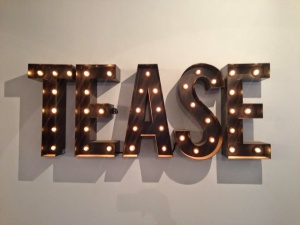
I’m sure everyone has heard that phrase before. And some of us are guilty of that action in our youth. (What a fun time, but I wouldn’t want to go back and relive a lot of it).
As an editor, I don’t get to see the tease too often. And, as a writer, I’ve forgotten the art of the tease. See, in both capacities, I’m looking at the larger picture. The entire story. Whether I’m editing or writing a full-length novel, the tease isn’t there.
But that doesn’t mean it’s not needed.
I recently attended a workshop on book reviews. The first item in the list of how a book review should be written, of course, was the tease. Tease the audience with a short quote, a profound statement, you get my drift. A way to hook the reader into continuing on. Later, the conversation included writing blurbs for our own works, seeing the good, bad, and ugly in book blurbs being currently sold on the market.
Later, the conversation included writing blurbs for our own works, seeing the good, bad, and ugly in book blurbs being currently sold on the market. We all agreed that it was more bad and ugly than good.
Why can’t writers write good blurbs and teasers? That’s for another day, another post.
So is the tease referred to playfully or will it get the bad wrap that it sometimes has?
I’d like to think of the tease playfully.
So let’s work on writing a good one.
How you might ask.
I like to say it has two sides. One the mechanical the other creative.
The mechanics will look a lot like my short sentences and paragraphs. Think of certain genres or sentence structure in paragraphs. A romance book’s paragraphs are short. The inner dialogue is important, but we keep those thoughts of self-doubt to a minimum in each paragraph. Think of it this way. If you had to read a ten-sentence paragraph on every insecurity, you’d want to shoot yourself. And the genre would have died out long ago. So, three sentence paragraphs are the norm. Or think of a scene where the action comes fast and furious. Short, brief sentences and paragraphs. That’s the mechanics of a tease.
Think these thoughts when working on a teaser for your book. Short, concise, fast, to the point, etc.
Let’s move on to the creative side. This is where wordplay comes into mind. If you reread my post above, I use a lot of descriptions, some cliche, but they’re used to make a point. I like to call the tease explosive in creativity. The first few words have to dynamite in order to hook and capture the reader’s attention so they don’t move on to the next book.
Nice. I need to show excitement, be dynamic. The words need to be bold and brash.
I suggest we begin with wordplay to generate ideas. Betray, jilt, loyal, abet, massacre, assassinate, slaughter, etc.
I then play around with what to say, how to say it, where to place descriptive words for maximum effect in the shortest sentence possible.
Betrayed by her sworn protector…
Slaughtered out of existence…
Abetted by the king…
As you can see, I’ve captured your attention. And, I’m not limited to a genre. The first is romance, the next would be Sci-Fi or fantasy, the last historical and its subgenre could by history, paranormal, even nonfiction. But none are limited to what I’ve noted.
Let’s take the first one into consideration.
Rejected and betrayed by Connor, Jaielle flees into the arms of another; will she find true love or uncover heinous master plot to destroy the one man sworn to protect her.
Nearly slaughtered out of existence, the American Eagle and Bison, now protected by laws, are thriving more than ever.
Abetted by the innocent king, the interloper is free to hatch his nefarious plans on the unsuspecting kingdom of Rordrum.
I think I did a pretty good job at the teasers above. I know what you’re thinking. I can hear the comments now. “Of course, she’s a writer. It will come easy.”
Not so. I’ve spent at least two hours on this post. And I did what I normally do. I got up, cleaned the kitchen and started supper to help clear my mind, to free it up to be creative.
I believe I suffer from what many editors and writers do. Overanalyzing. But if we step back, learn and practice the art of teasing. That’s another value we can add to our freelance business.